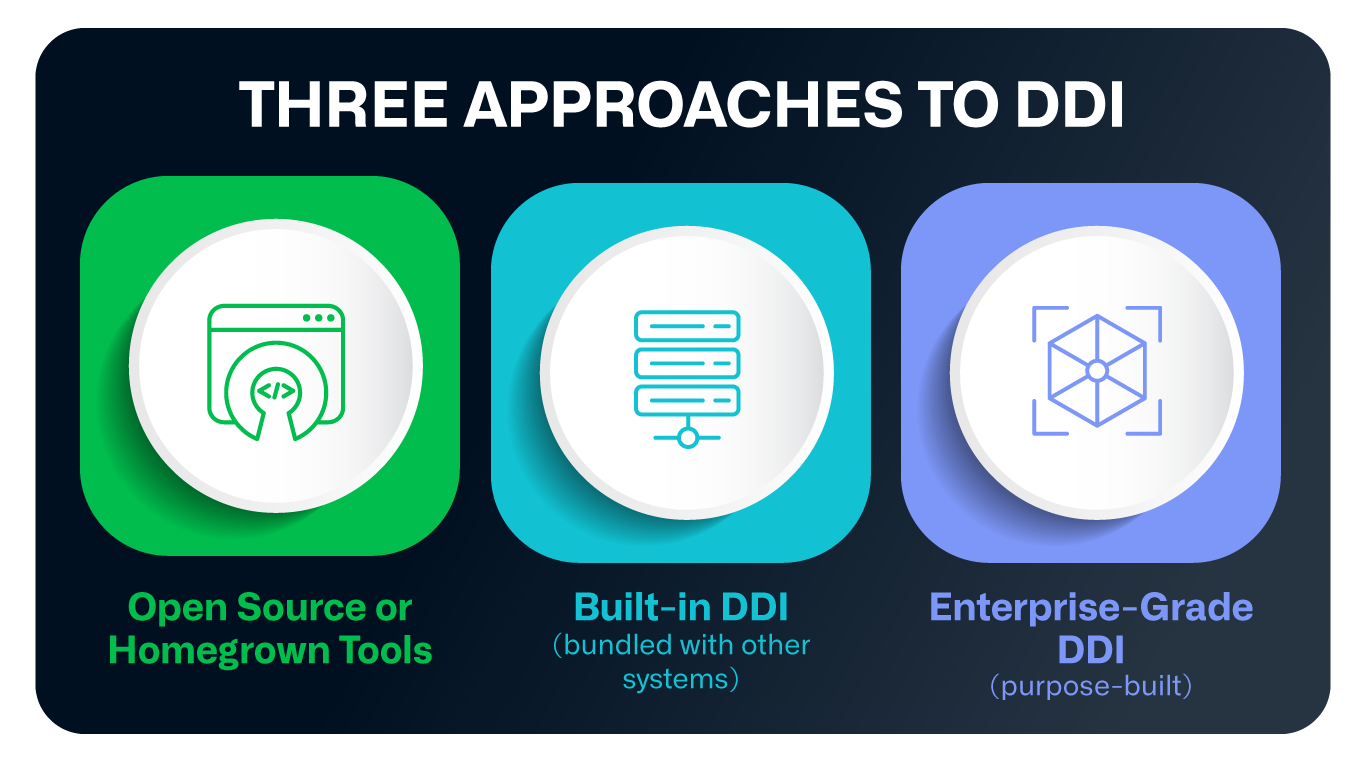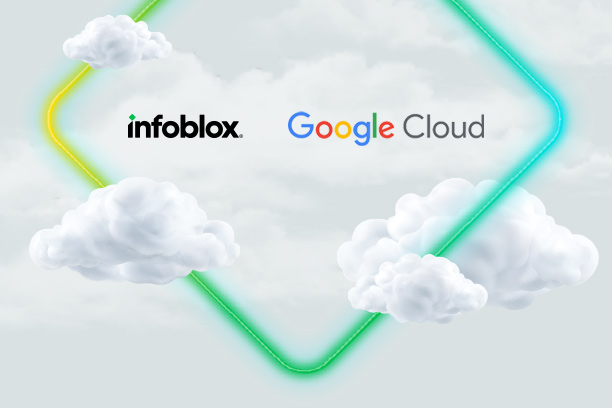In today’s hybrid, multi-cloud world, the foundation of your digital infrastructure matters more than ever. Recent research from Enterprise Strategy Group (ESG) sheds light on how your approach to DNS, DHCP and IP address management (DDI) impacts everything from cloud adoption to business agility and security posture.
The Critical Nature of DDI
DDI isn’t just a backend service—it’s the critical foundation that makes it possible for applications, servers, devices and cloud resources to find and connect with each other. As IT environments grow in complexity, DDI becomes essential for seamless operations across hybrid and multi-cloud environments.
Organizations typically fall into one of three categories in their DDI approach: using open-source or homegrown tools, leveraging DDI tools provided as part of other solutions or investing in purpose-built, enterprise-grade DDI.

The recent ESG research, based on a survey of 1,000 networking and security decision-makers, reveals significant differences in outcomes between these approaches.
Key Findings from ESG Research
The research indicates that organizations using non-enterprise grade DDI solutions face notable disadvantages compared to those using enterprise-grade alternatives. Here are some of the most striking findings:
Cloud Confidence Gap
Organizations using non-enterprise grade DDI reported 34 percent lower rates of complete confidence in meeting cloud adoption requirements compared to those using enterprise-grade solutions. Only 27 percent expressed complete confidence versus 41 percent for those with enterprise-grade DDI.
Increased Outage Frequency and Duration
Companies without enterprise-grade DDI experienced quarterly cloud outages 44 percent more frequently than their peers with enterprise-grade solutions. When outages did occur, non-enterprise DDI users were 38 percent more likely to take hours rather than minutes to recognize them, extending costly downtime.
Hybrid Visibility Challenges
Only 27 percent of organizations with non-enterprise DDI reported complete confidence in their visibility across cloud environments, compared to 44 percent of those with enterprise-grade solutions—a 63 percent difference that highlights a critical gap in hybrid cloud management capability.
Strategic IT Perception
A telling indicator of DDI’s broader impact: application developers’ perception of IT and security teams. Only 17 percent of organizations using non-enterprise DDI reported that application developers view them as a competitive differentiator, compared to 31 percent of those with enterprise-grade DDI—an 82 percent difference.
Security Automation Deficits
Organizations with non-enterprise DDI solutions showed a 24 percent gap in automating the identification of anomalous network activity and a 28 percent deficit in automating audit reporting compared to those using enterprise-grade alternatives.
Business Agility Impact
DDI approach is directly connected to business outcomes, with non-enterprise DDI users reporting 16 percent lower achievement in accelerated application delivery and 17 percent lower achievement in faster time to market—metrics that directly affect competitiveness.
The Universal DDI Solution
Infoblox Universal DDI™ Product Suite is an enterprise-grade DDI offering that transforms how critical network services are managed and deployed in hybrid, multi-cloud environments. It’s built on four key principles:
- Cohesive Management: A unified control plane that centralizes and simplifies network configuration, delivery and automation while allowing customers to use any major DNS solution
- Comprehensive Visibility: A single view of all network assets that accurately accounts for their location and activity across hybrid, multi-cloud environments
- Adaptive Delivery: Form factors that adapt to your business needs—from hardware appliances to software and cloud-based services that scale elastically
- Proactive Security: Networking that works synergistically with security solutions to deliver cyber resiliency through DNS protection
Customer Success with Universal DDI
Organizations across various industries are experiencing transformative results with Infoblox Universal DDI. Here are three examples:
Global SaaS Provider Transforms DDI for Cloud
A global SaaS provider was constrained by traditional Microsoft infrastructure where DNS and Active Directory were hosted on the same Windows Server. During a global security incident, they experienced network outages when these servers failed. They also struggled with limited visibility across hybrid environments and faced a strict timeline to migrate from on-premises Microsoft DNS to cloud-based solutions.
The organization selected Infoblox’s Universal DDI platform for its fully SaaS architecture, comprehensive workload discovery capabilities and flexible deployment options. This created a clear path to cloud-first infrastructure, provided unified visibility across hybrid environments, enhanced resiliency by decoupling DNS from Active Directory and established a foundation for seamless multi-cloud operations.
Major Entertainment Corporation Expands Globally
A major entertainment corporation focused on global expansion initially deployed NIOS DNS at larger sites and Microsoft DNS (part of Active Directory) at smaller sites. They needed a more robust alternative to Microsoft DNS and a more efficient way to deliver and manage DNS services across 30 sites globally.
The corporation implemented a tiered solution with a NIOS-based Anycast layer providing fault-tolerant DNS and internet resolution for all 30 sites. They deployed NIOS-X physical servers at each site, replacing Microsoft DNS servers for secondary DNS, local survivability and direct internet access for smaller studios. All sites are now centrally managed through the Infoblox Portal, ensuring enterprise-wide consistency for DNS policies while supporting site autonomy. This approach delivers reliable critical network services with local survivability while providing the flexibility needed for their continued global expansion.
Wholesale Distributor Builds Resilient Infrastructure
A large wholesale distributor of roofing and exterior building products experienced significant post-COVID growth, prompting the CIO to revamp their technology stack to build resilient infrastructure. They were using Microsoft for on-premises DNS while moving workloads to Microsoft Azure, AWS and Google Cloud. Their spreadsheet-based IP address management (IPAM) solution was cumbersome and error-prone, leading to issues like duplicate IPs. Additionally, their Microsoft DHCP server lacked redundancy and was impacted by a security incident, causing outages and revenue losses.
The company chose Universal DDI to replace their Microsoft on-premises servers. With Universal DDI, they achieved a centralized SaaS-managed solution across Azure and on-premises networks, comprehensive visibility through automated discovery and improved resiliency with highly available critical network services. The result was improved operational efficiency, comprehensive visibility and a truly resilient infrastructure.
The Path Forward
The ESG research clearly demonstrates that your DDI approach matters significantly. These are not just backend services—they are critical network services that directly impact your business outcomes.
Infoblox Universal DDI provides the cohesive management, comprehensive visibility, adaptive delivery and proactive security needed to thrive in today’s complex hybrid, multi-cloud environments. By taking a strategic approach to DDI, organizations can avoid the pitfalls identified in the research and position themselves for success in an increasingly distributed digital world.
Ready to learn how inadequate DDI could be affecting your business? Download the full ESG report 9 Pitfalls of Not Using Enterprise-Grade DDI to understand the risks and discover why enterprise-grade DDI is essential for modern network management.









